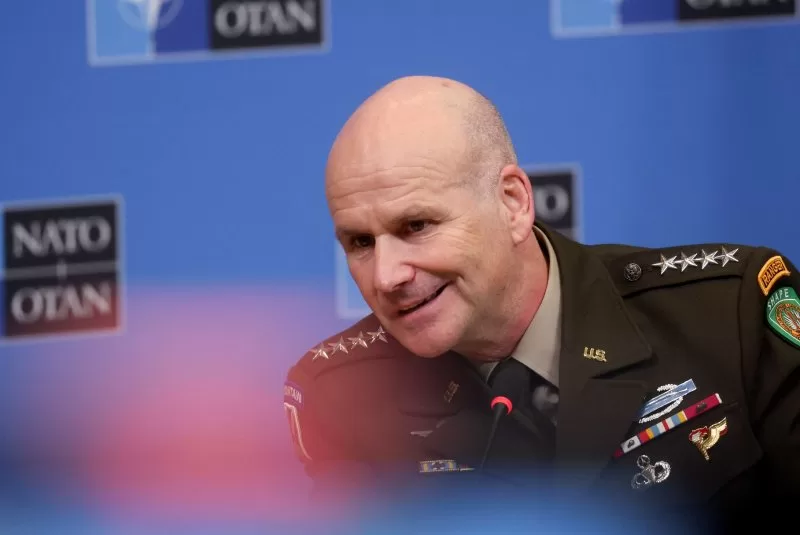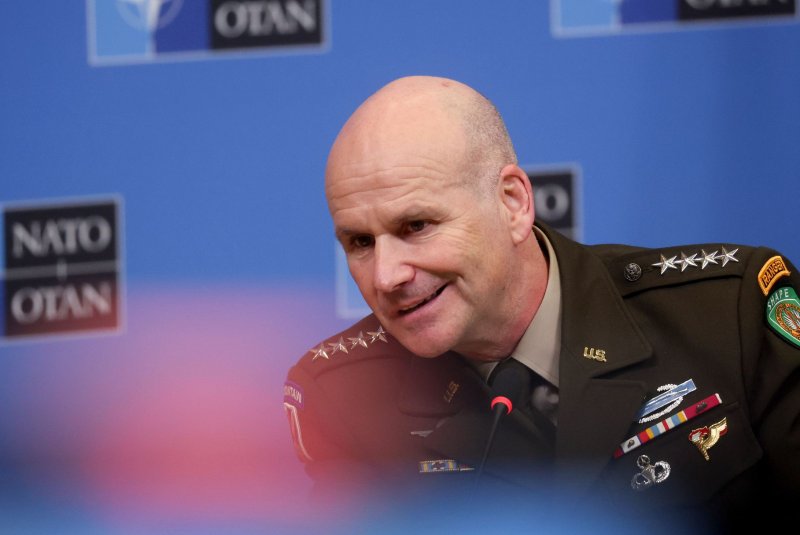Supreme Allied Commander of NATO Gen. Christopher Cavoli said Russia’s war with Ukraine would not be the end Russian aggression. File Photo by Oliver Hoslet/EPA-EFE
July 19 (UPI) — Artificial intelligence, anti-satellite warfare and the Russian bear extending its claws westward were among the most discussed topics at the 15th annual Aspen Security Forum this week.
Friday was the final day of the four-day conference and was set to feature remarks from Former National Security Adviser Condoleezza Rice.
Rice also is co-chair of the Aspen Strategy Group and served as national security adviser to President George W. Bush.
Rice was listed to participate in a panel discussion titled “Democratic Resilience in the Age of AI” alongside tech leaders from Microsoft and OpenAI.
Earlier in the week, United States and European officials warned of the challenges of keeping Russia and China in check.
U.S. Army Gen. Christopher Cavoli, head of U.S. European Command and the supreme allied commander for NATO, on Thursday said the Russian war in Ukraine will not be the end of Russia’s threat to Europe or even the United States.
“The outcome on the ground is terribly, terribly important,” Cavoli said at a panel discussion with top European leaders. “But we can’t be under any illusions. At the end of a conflict in Ukraine, however it concludes, we are going to have a very, very big Russia problem. …
“We are going to have a situation where Russia is reconstituting its force, is located on the borders of NATO, is led by largely the same people as it is right now, is convinced that we’re the adversary, and is very, very angry.”
German foreign and security adviser Jens Plötner echoed Cavoli’s sentiment, saying the war in Ukraine is the “bloodiest manifestation” of the West’s conflict with Russia, but “not the only one.”
“We have seen Russia reaching out to Africa. We have seen Russia rekindling ties with Tehran or, even worse, Pyongyang,” Plötner said. “So, I think all of this is part of the bigger picture, which we need to acknowledge.”
Looking skyward, United States officials on Thursday discussed the importance of the “final frontier” in maintaining global stability.
Space Force Gen. Stephen Whiting, commander of U.S. Space Command, and Air Force Lt. Gen. Jeffrey Kruse, director of the Defense Intelligence Agency, highlighted threats to U.S. space assets from China and Russia.
Kruse said China seeks to outpace the United States in space exploration and use that superiority in a way that is detrimental to national security.
“[China] counts on what they perceive as a U.S. over-reliance on space, and it intends to hold that capability at risk,” Kruse said, noting China is developing and testing directed-energy weapons, electronic warfare and anti-satellite technologies.
Russia, meanwhile, is working to reclaim its crown as the original space superpower, Kruse warned.
“What I would offer is both Russia and China view the use of space early on — even ahead of conflict — as important capabilities to deter or to compel behaviors, and we just need to be ready for those,” he said.
To deter these possible threats, Whiting said the United States is focused on countering anti-satellite tech by making its existing satellite constellations more resistant to attacks.
“We’re seeing a whole host of our constellations now heading in a direction of being more disaggregated, more distributed, having built-in defensive capabilities against these threats,” Whiting said. “But resilience is not going to get us there solely by itself.”
Whiting also noted the possibility of Russia attempting to put nuclear weapons in space in violation of the Outer Space Treaty signed in 1967, which coincidentally was the year Whiting was born.
“My entire life, it has been an expectation for mankind that we will not put a nuclear weapon or weapons of mass destruction in space,” he said. “And now, they are potentially doing that. And if that were to happen, it is a completely indiscriminate weapon. It would affect United States satellites, Chinese satellites, Russian satellites, European satellites, Indian satellites, Japanese satellites. It’s really holding at risk the entire modern way of life.”
In more localized security issues, United States officials on Wednesday noted the recent assassination attempt of former President Donald Trump at a Pennsylvania rally to emphasize the danger of extreme rhetoric on national politics.
Former Secretary of Defense Mark Esper said the incident happened due to a clear failure to secure the perimeter.
“Leaving exposed a rooftop less than 150 yards from the podium seems like a glaring error to most people,” he said of the shooter’s location.
The investigation is ongoing, but Esper feared speculation would lead to more inflammatory political rhetoric.
“You know, is it local or state versus federal? Who did this? Who did that?,” Esper said. “Each side has conspiracy theories about what happened, what didn’t happen.”
Former Secretary of Homeland Security Jeh Charles Johnson warned “unacceptable rhetoric makes unacceptable behavior acceptable” but also pointed to the wide availability of guns in the United States.
He said the AR-15 rifle the shooter used to kill one person and nearly kill Trump “is a weapon of war with no legitimate use in society.”
Experts also discussed the need for more accountability from global leaders in humanitarian crises — particularly in Ukraine, Gaza, and Sudan — and how the “hundreds of billions of dollars” green energy will influence GOP policies in favor alternatives to fossil fuel.

